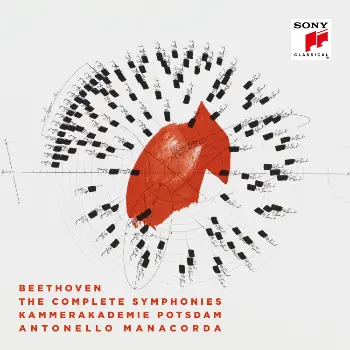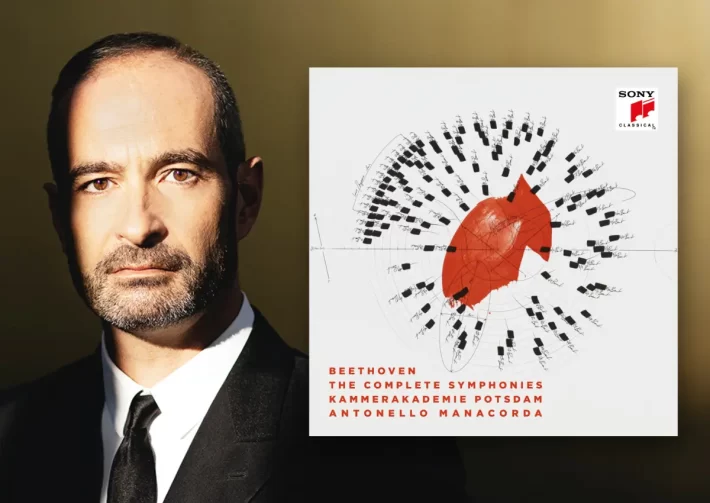In a recent Beginners Guide to Mendelssohn’s Scottish Symphony, I listed Manacorda and his Potsdam orchestra as my recommendation for a historically informed performance. The same holds for the entire cycle, and their earlier Schubert symphony cycle, so I was keen to hear their readings of Beethoven. Symphonies 1, 2, and 7 were released in late 2022, 5 and 6 late last year. Frustratingly, Sony has chosen to release this complete set instead of issuing the remaining symphonies separately, a wasteful duplication for collectors who already own the previous releases.
Performances of the first two symphonies are exceptional. The outer movements of the first are muscular and leonine, the Minuet (a Scherzo in all but name) wonderfully light on its feet. Manacorda ensures we sense the second symphony’s significant advancement on its predecessor, the first movement’s slow introduction volatile and spacious, his consistent care for balance and inner voices revealing the music’s increasing complexity. A strength of those earlier cycles is the lyricism of the Potsdam strings, a quality much to the fore in their rendering of the Adagio.
The reading of the Eroica is less successful. While Manacorda’s tempos are often close to Beethoven’s metronome markings, here the first movement is slower. While I am not arguing performers must exactly match Beethoven’s marking (Beethoven asks for dotted half =60 but Manacorda adopts dotted half=68), they should acknowledge that the marking is one way a composer communicates the music’s emotional state. Played at this slower tempo, the music’s ferocity and drive largely absent here. The playing is eloquent, beautifully balanced, and lyrical – regal rather than revolutionary.
The funeral march, two minutes slower than the Gardiner and Savall performances, is nevertheless less emotionally engaging than both, skimming along the surface of this intensely dramatic music. The final two movements are a return to form, the Scherzo light on its feet, and the finale finally capturing the music’s revolutionary zeal. The fourth symphony is exemplary, its slow movement again played with lyrical ardor, the final movement witty and urbane.
The opening of the fifth is plenty fast, driven hard yet lacking fire. The slow movement’s tempo choice is surprising in its relatively slowness compared to other historically informed versions. To my ears, It somehow changes the character Beethoven’s marking implies. It is undeniably beautiful, but has none of the restless agitation heard when the reading honors Beethoven’s metronome marking.
The Scherzo is more impressive, its Trio less brutal, and more balletic than the readings by Järvi and Antonini. Even with the addition of three trombones, brass is kept on a tight leash in the finale, never allowed to dominate the texture. This may be a relief to some, but it weakens the intensity of the music’s many jarring dissonances, better realized by Harnoncourt, Brüggen, and others mentioned above.
Manacorda’s approach better aligns with the sixth’s sunnier disposition. His peasants are less rambunctious in the Scherzo, and the storm less threatening than in other readings, but the gorgeously shaped Hymn of Thanksgiving is emotionally satisfying.
The seventh is also successful, particularly its Allegretto. The opening’s ominous tread establishes a particularly dark mood, answered by playing of increasing ardor and grief (why could the third’s funeral march not have a similar level of engagement?). The outer movements of the eighth are driven and rambunctious, the Allegretto scherzando particularly adept at capturing Beethoven’s sarcastic humor, the third movement vividly characterized.
While the opening movement of the ninth closely adheres to Beethoven’s metronome marking, one experiences more cataclysmic struggle in other readings. The Scherzo has plenty of character (throughout the cycle the woodwinds are wonderful, particularly the principal flute and bassoon). The trio is again far below the tempo marking, though this is one place where the composer’s marking does seem ludicrously fast. But the marking surely means the Trio should be at least as fast, if not faster, than the Scherzo.
If the Fifth’s Andante con Moto was too slow for me liking, I was genuinely surprised that Manacorda plays the Ninth’s Adagio so quickly. Surely this was a place where he could highlight the passionate lyricism of the Potsdam players? Manacorda’s finale is thoughtfully conceived, though tempo choices throughout the movement are closer to the older generation (Karajan and Böhm) than Beethoven’s actual markings.
The Collegium Vocale 1704 sings with accuracy and commitment, though one is acutely aware the balance achieved here is not what we would hear in the concert hall. Bass Dimitry Ivashchenko’s opening solo is a little hectoring, but overall, the four soloists acquit themselves well. A distinguished reading that nevertheless lacks the thrill and emotional impact of many others, especially Mackerras’ final recording with the Philharmonia Orchestra.
These performances seek to strike a balance (or is it compromise) between the old and new performance styles. Manacorda is certainly not the first to do so – many of the comparisons listed throughout this review also seek this balance – but occasionally these readings miss the revolutionary aspects of Beethoven’s music, stunting its emotional and spiritual potency. As many other full Beethoven Symphonies cycles, this one has its highlights, and the strongest performances here are of symphonies No. 2, 4, 7, and 8. Yet despite my admiration for these performers, this cycle does not change my current recommendations.
Image: Nikolaj Lund

Beethoven Symphonies – Recommended Comparisons
Harnoncourt | Savall | Gardiner | Mackerras
Beethoven – Symphonies No. 1-9
Maria Bengtsson – Soprano
Corinna Scheurle – Mezzo-Soprano
Dimitry Ivashchenko – Bass
Mauro Peter – Tenor
Collegium Vocale 1704
Kammerakademie Potsdam
Antonello Manacorda – Conductor

Check offers of this album on Amazon.
Album Details |
|
|---|---|
| Album name | Beethoven – The Complete Symphonies |
| Label | Sony Classical |
| Catalogue No. | 19658849982 |
| Amazon Music link | Stream here |
| Apple Music link | Stream here |

















